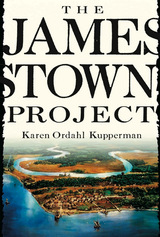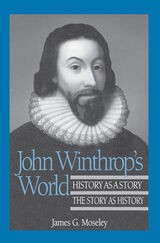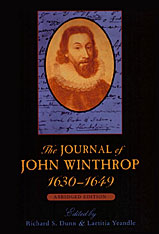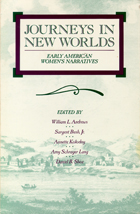6 start with J start with J

Listen to a short interview with Karen Ordahl KuppermanHost: Chris Gondek | Producer: Heron & Crane
Captain John Smith's 1607 voyage to Jamestown was not his first trip abroad. He had traveled throughout Europe, been sold as a war captive in Turkey, escaped, and returned to England in time to join the Virginia Company's colonizing project. In Jamestown migrants, merchants, and soldiers who had also sailed to the distant shores of the Ottoman Empire, Africa, and Ireland in search of new beginnings encountered Indians who already possessed broad understanding of Europeans. Experience of foreign environments and cultures had sharpened survival instincts on all sides and aroused challenging questions about human nature and its potential for transformation.
It is against this enlarged temporal and geographic background that Jamestown dramatically emerges in Karen Kupperman's breathtaking study. Reconfiguring the national myth of Jamestown's failure, she shows how the settlement's distinctly messy first decade actually represents a period of ferment in which individuals were learning how to make a colony work. Despite the settlers' dependence on the Chesapeake Algonquians and strained relations with their London backers, they forged a tenacious colony that survived where others had failed. Indeed, the structures and practices that evolved through trial and error in Virginia would become the model for all successful English colonies, including Plymouth.
Capturing England's intoxication with a wider world through ballads, plays, and paintings, and the stark reality of Jamestown--for Indians and Europeans alike--through the words of its inhabitants as well as archeological and environmental evidence, Kupperman re-creates these formative years with astonishing detail.

In the first in-depth study of Winthrop since 1958, James G. Moseley provides a fascinating new look at this extraordinary man, paying careful attention to the connections between Winthrop’s political activity and his writing. Moseley first examines Winthrop as a writer, using the journal to analyze Winthrop as a man resolving challenges based as much on his acutely pragmatic intelligence as on his deeply felt religious convictions. Second, Moseley traces how historians have responded to Winthrop—how his famous journal has been read and misread by those who have filtered the man and his cultural context through many lenses.
By examining Winthrop’s ancestors and early life in England, especially the religious changes he experienced, Moseley removes the blinders of modernism, portraying Winthrop as never before. He shows how Winthrop’s successful struggle to accept the deaths of his first two wives led him away from moralistic views of Christianity, himself, and his world to more magnanimous views.
Arguing that writing was the medium through which Winthrop developed his capacity for leadership, Moseley shows how the journal enabled Winthrop to reflect objectively on his situation and to adjust his behavior. Winthrop was, Moseley suggests, not only a politician but a historian, and his interpretations of foundational events in American history in his journal are an invaluable resource for understanding the nature of leadership and the meaning of liberty in Puritan America.
Winthrop’s World is a very graceful, well-written, and engaging narrative that provides new insight into the Puritan way of life and into the man who provided a window between our world and his.

One of the best-educated of the colonialists, Odell, a physician turned Anglican minister and then writer, lived the gamut of experience: powerful friends sustained him and the British commanders-in-chief Sir William Howe, Henry Clinton, and Sir Guy Carleton employed him; nevertheless, during the war he was a lonely exile ("Tory hunters" forced him from his home in 1775), and, at the end of the war, when his hope for reconciliation between the Loyalists and the Americans came to nothing, he reluctantly emigrated to Canada.
Here is a voice, all but silenced for over two hundred years, that must now be heard if we are to better understand the American Revolution.

For 350 years Governor John Winthrop's journal has been recognized as the central source for the history of Massachusetts in the 1630s and 1640s. Winthrop reported events--especially religious and political events--more fully and more candidly than any other contemporary observer.
The governor's journal has been edited and published three times since 1790, but these editions are long outmoded. Richard Dunn and Laetitia Yeandle have now prepared a long-awaited scholarly edition, complete with introduction, notes, and appendices. This full-scale, unabridged edition uses the manuscript volumes of the first and third notebooks (both carefully preserved at the Massachusetts Historical Society), retaining their spelling and punctuation, and James Savage's transcription of the middle notebook (accidentally destroyed in 1825).
Winthrop's narrative began as a journal and evolved into a history. As a dedicated Puritan convert, Winthrop decided to emigrate to America in 1630 with members of the Massachusetts Bay Company, who had chosen him as their governor. Just before sailing, he began a day-to-day account of his voyage. He continued his journal when he reached Massachusetts, at first making brief and irregular entries, followed by more frequent writing sessions and contemporaneous reporting, and finally, from 1643 onward, engaging in only irregular writing sessions and retrospective reporting. Naturally he found little good to say about such outright adversaries as Thomas Morton, Roger Williams, and Anne Hutchinson. Yet he was also adept at thrusting barbs at most of the other prominent players: John Endecott, Henry Vane, and Richard Saltonstall, among others.
Winthrop built lasting significance into the seemingly small-scale actions of a few thousand colonists in early New England, which is why his journal will remain an important historical source.


Four early American women tell their own stories: Mary Rowlandson on her capture by Indians in 1676, Boston businesswoman Sarah Kemble Knight on her travels in New England, Elizabeth Ashbridge on her personal odyssey from indentured servant to Quaker preacher, and Elizabeth House Trist, correspondent of Thomas Jefferson, on her travels from Philadelphia to Natchez. Accompanied by introductions and extensive notes.
"The writings of four hearty women who braved considerable privation and suffering in a wild, uncultivated 17th- and 18th-century America. Although confined by Old World patriarchy, these women, through their narratives, have endowed the frontier experience with a feminine identity that is generally absent from early American literature."—Publishers Weekly
READERS
Browse our collection.
PUBLISHERS
See BiblioVault's publisher services.
STUDENT SERVICES
Files for college accessibility offices.
UChicago Accessibility Resources
home | accessibility | search | about | contact us
BiblioVault ® 2001 - 2024
The University of Chicago Press









